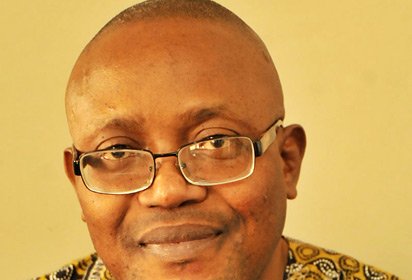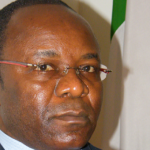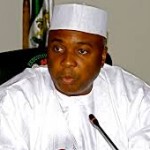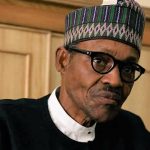OPINION: The Worn-out Road to Economic Recovery
Featured Contributors/Columnists, Latest Headlines Tuesday, March 21st, 2017
By Owei Lakemfa
I cannot get the picture of Mrs. Esther Gadimah off my mind. A man carried the old woman in his hands like a baby. She was one of the pensioners that had come to the Benin City verification centre of the Pension Transitional Arrangement Directorate. She looked frail, worn-out, resigned, sick and bewildered. The immediate ‘recovery’ for her is to be paid her pension. Same for other pensioners and workers. For public servants owed two or more years salary -as is the case in a number of states- the talk about “economic recovery” is gibberish.
Being basically civil service, the economy of states can begin to recover only when wages and pension are paid; that is the beginning of real recovery. People must have hope and be empowered before they can be productive. It will be wishful thinking to expect a hungry man or woman to contribute to economic recovery.
The Economic Recovery and Growth Plan, 2017-2020 talks about social inclusion and investing in the people. This includes provision of jobs. This is good, but jobs will make little or no sense if salaries are unpaid because the bottom line why people take up employment, is to be paid salaries.
Recovery, is about getting well again after been sick; it is the restoration of health; the process of improving after being in a bad condition. For a country like ours with an oil monoculture, we cannot seek the road to recovery merely by hoping for steady oil production and prices. First, we must know how much crude oil we produce daily; not just the number of barrels we officially export. We must add value to our raw materials. We cannot recover if all we do is simply export oil in its crude form. Even if we cannot refine for export, we must meet our internal consumption needs. To expend billions of Naira importing petroleum products and expend scarce foreign exchange doing so, cannot lead to recovery. I know the plan is critical of our overt reliance on oil; but that is a trite we have been fed with for over four decades. The same is true about the need to restructure. The 1976-79 Obasanjo regime called it “belt-tightening” The Shagari administration said it was Economic Recovery while the Babangida regime adopted the World Bank/International Monetary Fund nomenclature; Structural Adjustment Programme.
Real recovery in the oil sector starts with refining. We all know that if we refine, the poor who use kerosene will not buy a litre at N400; N60 will be a more realistic price. We know that if we refine, the litre of fuel which is going for N145 will cost no more that 45 percent of that price.
As expected, the Plan declares that we must achieve energy sufficiency. On this we have agreed for over fifty years. Providing electricity was one of the three reasons adduced for the Russian revolution a hundred years ago. So humanity knows its centrality to development. The Nigerian elites after many years of playing politics with energy decided that the best option was to privatize the sector. So the power sector was auctioned. But over the years, the sector simply became worse with the country expending billions of Naira on what it has already sold. Alhaji Aliko Dangote is said to be the biggest industrialist and richest man in Africa, so the apostles who chant that the private sector is the engine room of growth, should ordinarily, respect him. But when he pointed out the fact that the energy sector is not delivering and that the best thing is to review the privatization of the sector, they shouted him down. Rather than critically examine his call, they dismissed him as talking rubbish. Even the regulatory Nigeria Electricity Regulatory Commission (NERC) joined the chorus against Dangote. If on a critical issue as power, Dangote, and former Vice President Atiku Abubakar are said to be talking nonsense, then who is talking sense?
Recovery should begin with what we eat and consume. A simple, time-tested policy which we should put in place is to eat what we grow and grow what we eat. We cannot talk about recovery when our supermarkets are full of all sorts of imported junk. To show we mean business, the least I expect is to make a policy that at least 70 percent of all goods sold in supermarkets must be local and that such outlets like Shoprite cannot import basic agriculture products and fruits that are produced in the country.
For real recovery, patronizing Made-in-Nigeria goods should be an enforceable policy. For instance, we can decide, with only a few exceptions, that all official vehicles must be those assembled in the country.
There is a demonstrable commitment to agriculture, but this has to be made part of our lives. A return to the agriculture and school farms of the 1950s and early 1960s, and the Murtala/Obasanjo regime’s Operation Feed the Nation campaign, would be more like it.
Can we seriously talk about economic recovery when we are a nation of over 180 million people with collapsed textile and footwear sectors? The Plan talks about the need to educate, train and develop Nigerians on the basis of a knowledge economy; the talk is good, but the issue is what policy will make this a reality?
If in truth we want to embark on the road to recovery, making Chapter Two of the Constitution on the Directive Principles of State Policy, justiciable will be a basic step. This Chapter amongst other fundamental principles gives free education to Nigerians and states that “the security and welfare of the people shall be the primary purpose of government” It also directs that the economic system must not be operated “in such a manner as to permit the concentration of wealth or the means of production and exchange in the hands of few individuals or of a group”
There is a claim that the Plan is based on wide and deep consultations with many ‘stakeholders’ This may be so, but it is not enough. If under military rule in 1985, the future direction of the economy was subjected to a national debate, not less is expected under claimed democratic skies.
Related Posts
Short URL: https://www.africanexaminer.com/?p=38543





















